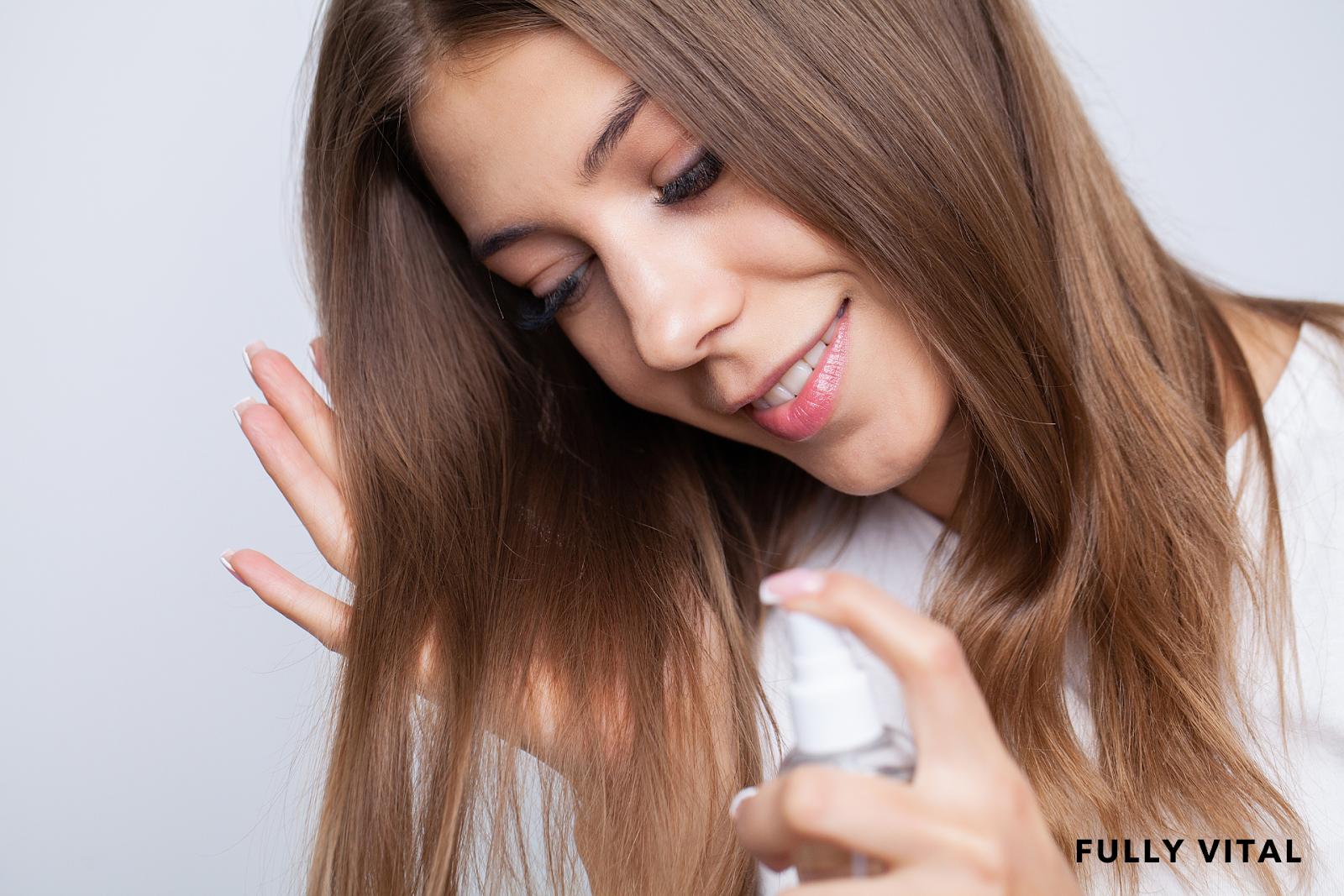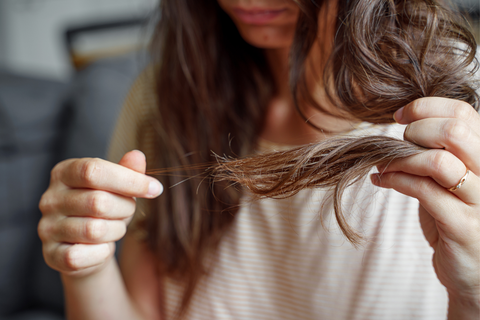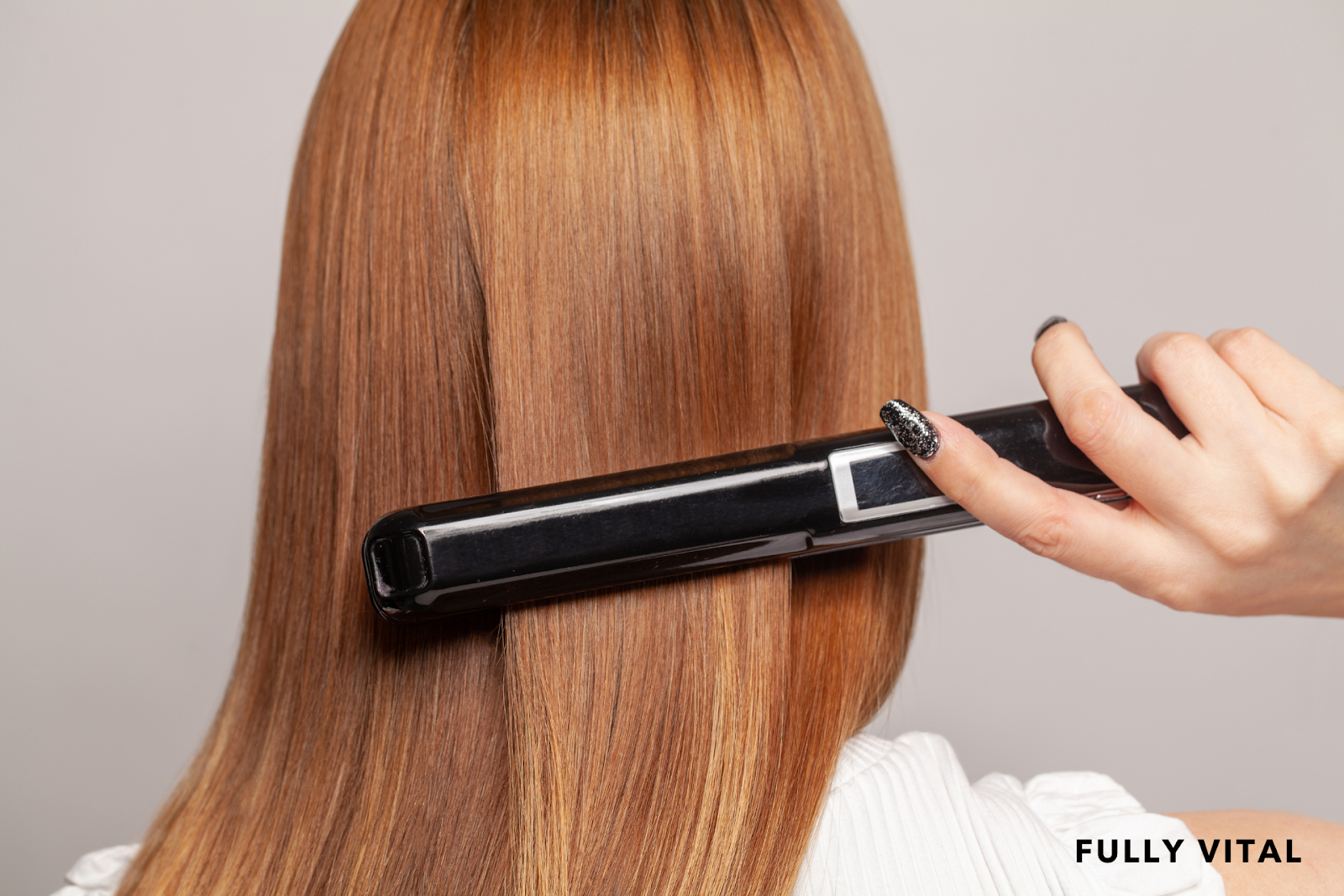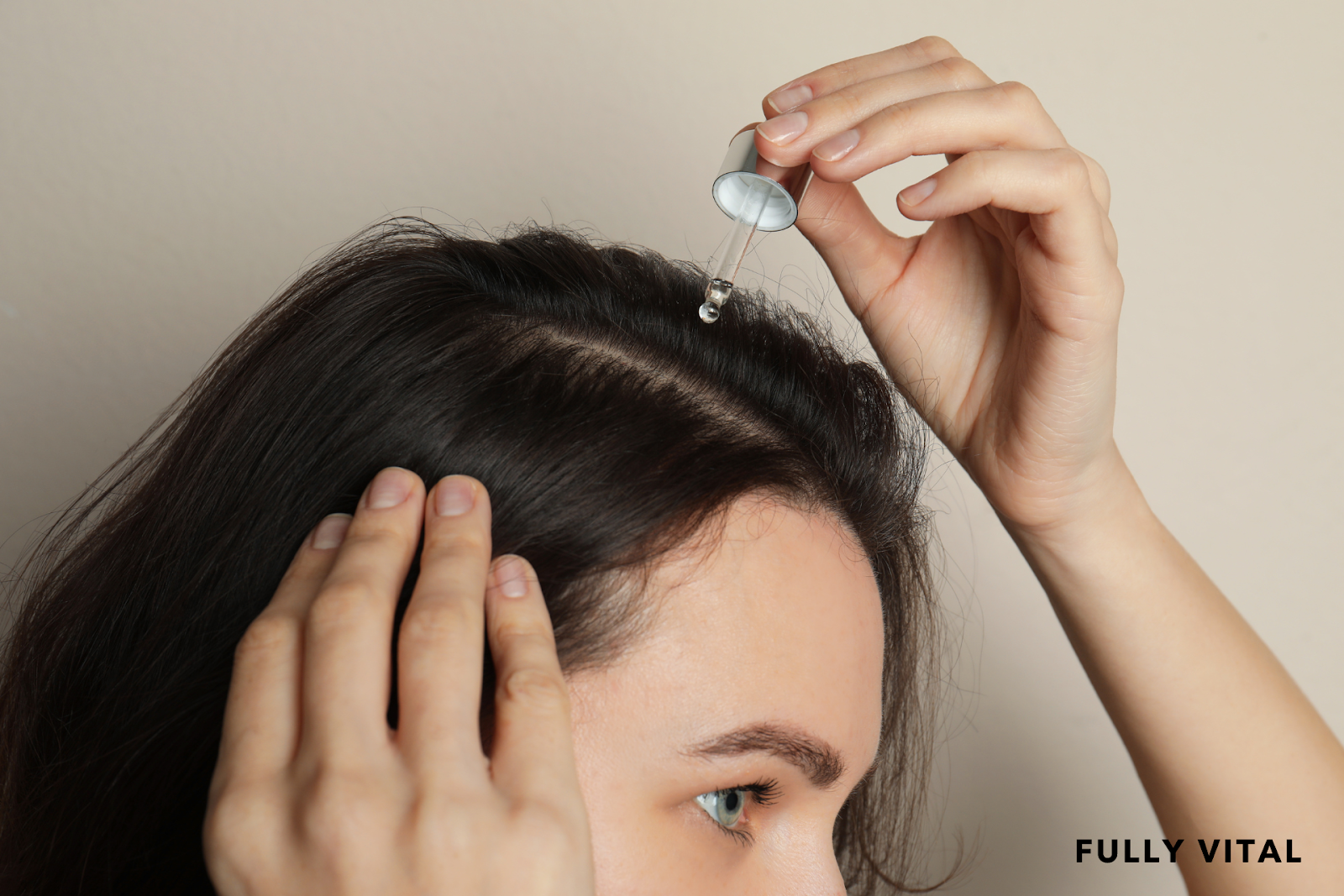
Vitamin F (Linoleic Acid) For Hair: Unlocking Silky, Manageable Strands
Start your journey to shinier, healthier hair with Vitamin F, also known as Linoleic Acid, a key but often neglected hair care ingredient.
This essential nutrient is crucial for those aiming to rejuvenate their hair, regardless of type.
This guide explores Vitamin F's comprehensive benefits for hair health, from reviving dry, dull locks to encouraging vibrant, continuous growth.
Discover how Linoleic Acid provides a holistic hair care approach and learn how adding Vitamin F to your routine can turn your hair into a silky, manageable asset you'll love to show off.
Leverage the nutritional benefits of Vitamin F for your hair with our effective hair growth solutions.
Experience the combined power of science and nature, designed to nurture your hair from root to tip.

I LOVE MY HAIR NOW
FullyVital hair serum and hair vitamins made tremendous improvements in my hair. I truly love my hair now.
Shop Hair ProductsWhat Is Vitamin F (Linoleic Acid) And Why Is It Important?
Understanding Vitamin F
Vitamin F is a term used to describe two essential fatty acids necessary for health: omega-6 (Linoleic Acid) and omega-3.
These are vital for cellular health and perform crucial roles in various bodily functions, including the health of your scalp and hair follicles.
It's important to note that these essential fatty acids are called "essential" because your body cannot synthesize them on its own; they must be obtained through your diet.
Importance Of Linoleic Acid For Hair
Linoleic Acid specifically has significant benefits for hair health.
It aids in maintaining the moisture level of the hair, ensuring strands are neither too dry nor too brittle.
This essential fatty acid helps to improve hair's elasticity, making it less prone to breaking and more resilient to styling and environmental stresses.
Moreover, Linoleic Acid is instrumental in supporting the natural production of sebum, the scalp's own moisturizing oil, which helps to keep hair naturally conditioned and lustrous.
Sources Of Linoleic Acid
Linoleic Acid can be found in various dietary sources, including plant oils like sunflower, safflower, and soybean oils, as well as in nuts and seeds.
Incorporating these foods into your diet can help ensure your body, and by extension, your hair, receives the essential nutrients it needs.
For direct hair benefits, look for hair care products that list Linoleic Acid or sources of it, such as those mentioned oils, in their ingredients.
Integrating Vitamin F Into Your Hair Care Routine
To maximize Linoleic Acid's advantages for your hair, integrate it into your diet and hair care regimen.
Consuming foods high in Linoleic Acid boosts overall and hair health, while applying hair products enriched with this essential fatty acid directly improves your hair's condition and appearance, leading to a smoother, more manageable mane.
How Does Vitamin F Contribute To Hair Health?
The Role Of Essential Fatty Acids In Hair Structure
The structure of your hair is significantly impacted by the nutrients you provide to your body, with essential fatty acids playing a pivotal role.
Linoleic Acid (Vitamin F) contributes to the lipid barrier function of the scalp, which is vital in maintaining hydration levels.
A well-hydrated scalp ensures that hair follicles remain healthy and produce strong, elastic strands.
This is crucial because hair that lacks essential fatty acids can appear dull, dry, and is more susceptible to damage.
Enhancing Hair Growth With Linoleic Acid
Linoleic Acid not only improves hair texture and strength but also plays a role in stimulating hair growth.
It does this by supporting the health of the scalp and hair follicles.
A scalp that is well-nourished and free from inflammation is better equipped to foster the growth of new hair.
Additionally, Linoleic Acid may help in regulating the production of sebum.
This regulation ensures that hair follicles are not clogged by excess oil, reducing the risk of hair loss and promoting the growth of new strands.
Preventing Hair Loss Through Proper Nutrition
Proper nutrition, including adequate intake of Linoleic Acid, is essential in preventing hair loss.
Deficiencies in essential fatty acids can lead to scalp issues such as dandruff and seborrheic dermatitis, which can exacerbate hair thinning and loss.
By maintaining a balanced diet rich in essential fatty acids, you can help keep your scalp in optimal condition, minimizing hair fall and encouraging healthier hair growth.

The Scientific Evidence
Research supports the role of Linoleic Acid in promoting hair health.
Studies have shown that when applied topically, Linoleic Acid can improve hair's resilience, reduce breakage, and enhance shine.
Moreover, dietary sources of Linoleic Acid contribute to overall health, which in turn benefits hair growth and condition.
How Can You Incorporate Vitamin F Into Your Hair Care Routine?
Dietary Changes For Healthier Hair
Incorporating foods rich in Vitamin F (Linoleic Acid) is a foundational step towards better hair health.
Focus on adding more nuts, seeds, and plant-based oils like sunflower, safflower, and flaxseed oil to your diet.
These not only enhance your overall health but directly contribute to stronger, shinier hair.
Remember, what you eat reflects on your hair; a balanced diet rich in essential nutrients can significantly improve hair texture and growth.
Choosing The Right Hair Care Products
When selecting hair care products, look for those containing Linoleic Acid or other sources of Omega-6 fatty acids.
Read ingredient labels carefully – products formulated with natural plant oils are more likely to contain high levels of Vitamin F.
Shampoos, conditioners, and hair serums enriched with these oils can help restore moisture, improve elasticity, and add a natural shine to your hair.
Topical Applications And Treatments
Apart from dietary changes and product selection, direct topical application of Vitamin F-rich oils can profoundly impact your hair's health.
Regularly massaging your scalp with a small amount of sunflower or safflower oil can boost blood circulation, promote hair growth, and provide deep moisturization.
Additionally, consider incorporating weekly hair masks or treatments that contain Linoleic Acid to deeply condition and strengthen your hair.
Consistency Is Key
Integrating Vitamin F into your hair care routine requires consistency for the best results.
Regularly consuming foods high in Linoleic Acid and consistently using hair care products enriched with this nutrient can lead to visible improvements in hair texture, strength, and growth over time.
Make these practices a regular part of your hair care regimen to achieve and maintain silky, manageable strands.
What Are The Top Products Containing Vitamin F For Hair?
When choosing Vitamin F products for healthier hair, focus on those known for quality and effectiveness.
Below are leading Linoleic Acid products for silkier, more manageable hair:
Nourishing Shampoos And Conditioners
Look for hydrating shampoos with sunflower oil high on the ingredient list, as it's rich in Linoleic Acid, helping maintain hair's moisture.
Similarly, choose restorative conditioners containing safflower oil to detangle, reduce breakage, and leave hair soft and manageable.
Leave-In Treatments And Serums
Choose an Argan oil hair serum, a rich source of Vitamin F, to protect against heat and styling damage while moisturizing.
Similarly, use a flaxseed oil scalp treatment to nourish hair roots and promote a healthier scalp, encouraging hair growth.
Hair Masks And Deep Conditioners
Use shea butter hair masks, rich in Linoleic Acid, for a weekly deep conditioning that repairs and strengthens hair strands.
Similarly, opt for an avocado oil deep conditioner, abundant in essential fatty acids, to hydrate and rejuvenate dry, brittle hair.

Dietary Supplements
If you prefer to boost your Linoleic Acid intake through supplements, evening primrose oil is a good choice.
It’s high in Omega-6 fatty acids and can support overall hair health when taken regularly.
Specialized Hair Treatments
Some professional hair treatments now include Vitamin F in their formulas to enhance hair texture and strength.
These treatments can be particularly beneficial for damaged or color-treated hair.
Discover The Key Benefits And Features Of Fully Vital Hair Growth SolutionsFully Vital is dedicated to fostering vibrant, healthy hair, which has inspired our unique line of hair growth products aimed at combating hair aging and improving your relationship with your hair. Key Features and Benefits Include:
Step into a new era of hair care with Fully Vital's hair growth solutions — the ultimate solution for rejuvenated, youthful hair. Start your transformation today and see the unique difference our solutions can make. |
Final Thoughts
Linoleic Acid, or Vitamin F, emerges as a key yet underappreciated element in achieving healthy, vibrant hair.
By focusing on internal nourishment and external care, it offers a comprehensive solution for enhancing hair texture, strength, and growth.
Incorporating Linoleic Acid into both diet and hair care routines can lead to significant improvements, emphasizing the deep connection between what we consume and the health of our hair.
This approach not only promises more manageable and resilient strands but also highlights the broader relationship between nutrition and beauty, advocating for a holistic path to hair wellness.
Expand your hair wellness journey beyond Linoleic Acid by exploring our variety of hair growth products, each designed to cater to different aspects of hair health.
Discover a space where each product, including our acclaimed Enhance Hair Serum, supports a holistic approach to hair care, smoothly integrating with your lifestyle and dietary choices.
Read Also:
- From Theory To Reality: Understanding Finasteride Results
- Discover The Latest Trends: Mesmerizing Grey Highlights
- Effective Ways To Repair And Prevent Brittle Hair Damage
Frequently Asked Questions
Can Vitamin F (Linoleic Acid) help with scalp conditions like psoriasis or eczema?
Vitamin F, known for its anti-inflammatory properties, can help alleviate symptoms of scalp conditions such as psoriasis or eczema.
Regular use of linoleic acid-enriched hair products may reduce scalp inflammation and irritation, although it should not replace treatments prescribed by healthcare professionals.
Is Vitamin F suitable for all hair types?
Yes, Vitamin F is suitable for all hair types.
Its hydrating and strengthening properties benefit dry, oily, curly, straight, fine, and thick hair.
Adjust the product and application according to your hair type and condition for the best results.
How often should I use Vitamin F products on my hair?
The frequency depends on your hair’s condition and the type of product used.
For topical treatments like oils or serums, 2-3 times a week is generally recommended.
For shampoos and conditioners, regular use during your hair wash routine is appropriate.
Listen to your hair's needs and adjust accordingly.
Can I use Vitamin F products on colored or chemically treated hair?
Yes, Vitamin F products can be beneficial for colored or chemically treated hair.
They can help restore moisture and elasticity, reducing breakage and fading.
Look for products specifically designed for treated hair for added benefits.
Are there any side effects of using too much Vitamin F on hair?
Overuse of Vitamin F, particularly in pure oil form, can lead to greasy, limp hair.
If used excessively, it may also cause scalp buildup.
Use moderately and adjust the amount based on your hair's response.
How long does it take to see results from using Vitamin F in hair care?
Results can vary based on hair type, condition, and the consistency of product use.
Generally, noticeable improvements in hair texture and hydration may be seen within a few weeks of regular use.
Can men use Vitamin F for hair care?
Yes, men can benefit from using Vitamin F in their hair care routine, particularly if experiencing dryness, thinning, or are in need of scalp care.
Does Vitamin F help with hair growth?
While Vitamin F primarily improves hair health by strengthening and moisturizing, a healthy scalp environment supported by Linoleic Acid can indirectly promote hair growth.
Can I leave Vitamin F oils in my hair overnight?
Yes, you can leave Vitamin F oils in your hair overnight for deep conditioning.
However, make sure to protect your pillowcase and wash your hair thoroughly the next day to prevent residue build-up.
Are there natural ways to get Vitamin F besides hair care products?
Incorporating foods rich in Linoleic Acid, such as nuts, seeds, and vegetable oils, into your diet is a natural way to boost your Vitamin F intake.
This internal nourishment can complement external hair care practices for overall hair health.
Sources:
- Ryu, H. S., Jeong, J., Lee, C. M., Lee, K. S., Lee, J.-N., Park, S.-M., & Lee, Y.-M. (2021). Activation of Hair Cell Growth Factors by Linoleic Acid in Malva verticillata Seed. Molecules, 26(8), 2117. https://doi.org/10.3390/molecules26082117
- Huang, T.-H., Wang, P.-W., Yang, S.-C., Chou, W.-L., & Fang, J.-Y. (2018). Cosmetic and Therapeutic Applications of Fish Oil’s Fatty Acids on the Skin. Marine Drugs, 16(8), 256. https://doi.org/10.3390/md16080256
- Mercola, J., & D’Adamo, C. R. (2023). Linoleic Acid: A Narrative Review of the Effects of Increased Intake in the Standard American Diet and Associations with Chronic Disease. Nutrients, 15(14), 3129. https://doi.org/10.3390/nu15143129
- Whelan, J., & Fritsche, K. (2013). Linoleic Acid. Advances in Nutrition, 4(3), 311–312. https://doi.org/10.3945/an.113.003772








